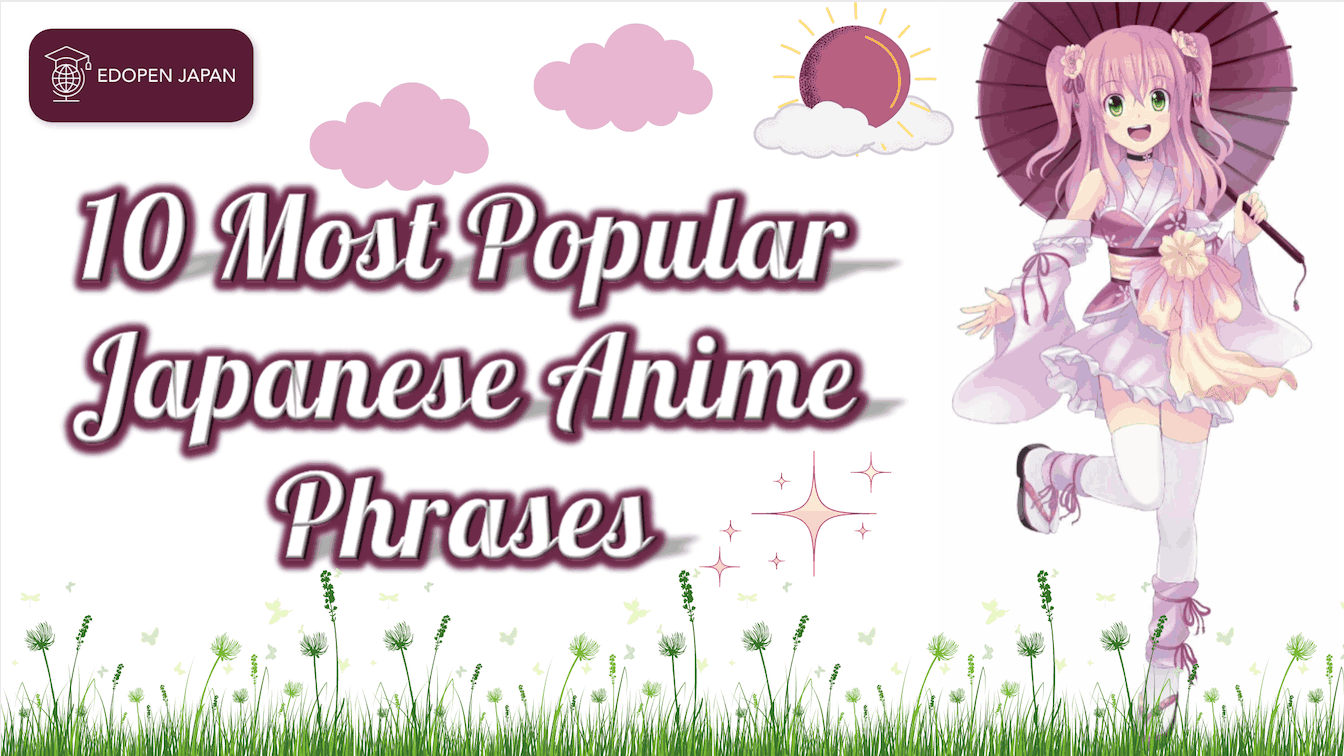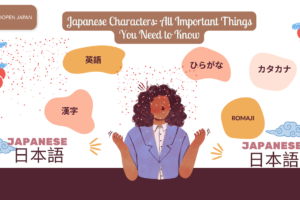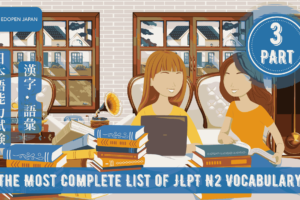Are you one of the biggest fans of Japanese anime? In this article, we will tell you the meaning of popular Japanese anime phrases in English. Not only can you enjoy fabulous scenes and stories in Japanese anime, but you can also learn and master Japanese through anime.
Not only that, within some special scenes, the famous and super cool catchphrases that we can hear in this anime even have a very deep philosophy that would insanely inspire us as well as super iconic and cute expressions.
Also, check out our discussion on Famous Anime Quotes in Japanese below as well as some discussion of phrases often used in everyday Japanese conversation!
Read also:
What does “Kabedon (壁ドン)” Mean in Japanese?
What’s the Meaning of “Sasuga” (さすが)?
What’s the Meaning of “Naruhodo (なるほど)”?
And, here are the top 10 most popular Japanese anime phrases for you!
Contents
- 1. “Omae Wa Mou Shinderu” – Kenshiro
- 2. “Dattebayo!” – Uzumaki Naruto
- 3. “Kaizokuou Ni, Ore Wa Naru!” – Monkey D. Luffy
- 4. “Yare Yare Daze!” – Jotaro Kujo
- 5. “Mada Mada Dane” – Ryouma Echizen
- 6. “Tensai Desu Kara!” – Hanamichi Sakuragi
- 7. “I don’t know everything, I just know what I know.” – Hanekawa Tsubasa
- 8. “Shinjitsu Wa Itsumo Hitotsu!” – Conan Edogawa
- 9. “Keikaku Doori” – Light Yagami
- 10. “Nico Nico Nii!” – Nico Yazawa
- Conclusion
1. “Omae Wa Mou Shinderu” – Kenshiro
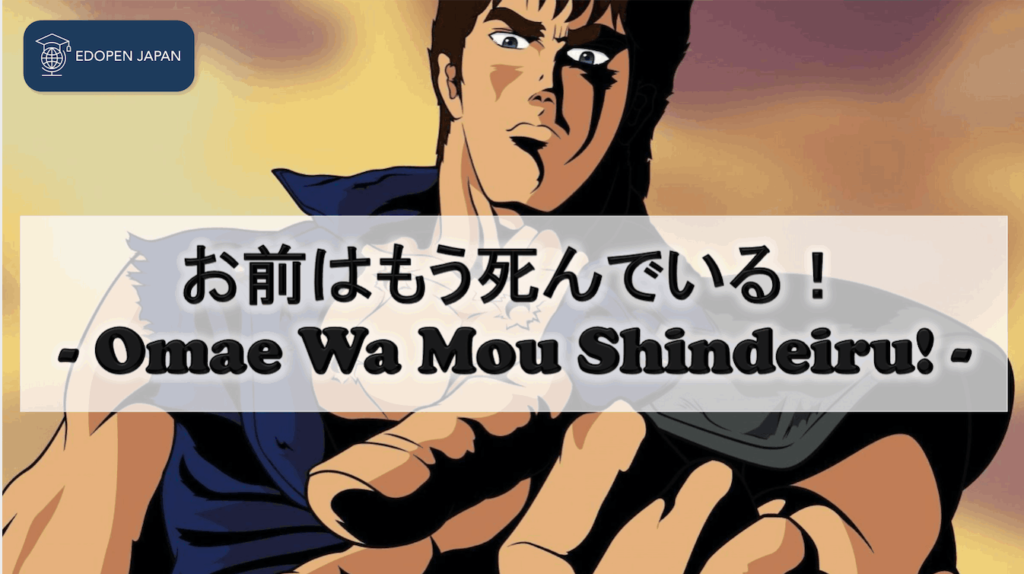
First of all, this super famous and iconic phrase is an expression from a manga and anime called Hokuto no Ken. This anime/manga series is translated into English as Fist of the North Star. The phrase “Omae wa mou shindeiru” is often uttered by the protagonist character named Kenshiro, a martial arts master who has become a hero with a beautiful purpose to help the weak and kill those who rule by violence. This anime was first shown in Japan in 1983.
Furthermore, the literal translation of the expression “omae wa mou shindeiru [お前はもう死んでいる]” into English is “you are already dead”. Kenshiro, the main character of this anime/manga, says this as his iconic line. Then, Kenshiro’s villains will say “O nani?!” as a reaction, which means “What?!”
We can break down the meaning of this hit phrase as follows:
[お前はもう死んでいる]
Omae Wa Mou Shindeiru
- お前 (omae) – You (rude way of saying you or in front of me)
- もう (mou) – already, soon, now;
- 死んでいる (shindeiru) – die, (going) to be dead.
However, although this phrase is very iconic, as this phrase is considered a rude expression, please use this ONLY as a joke with your friends, nothing more.
2. “Dattebayo!” – Uzumaki Naruto
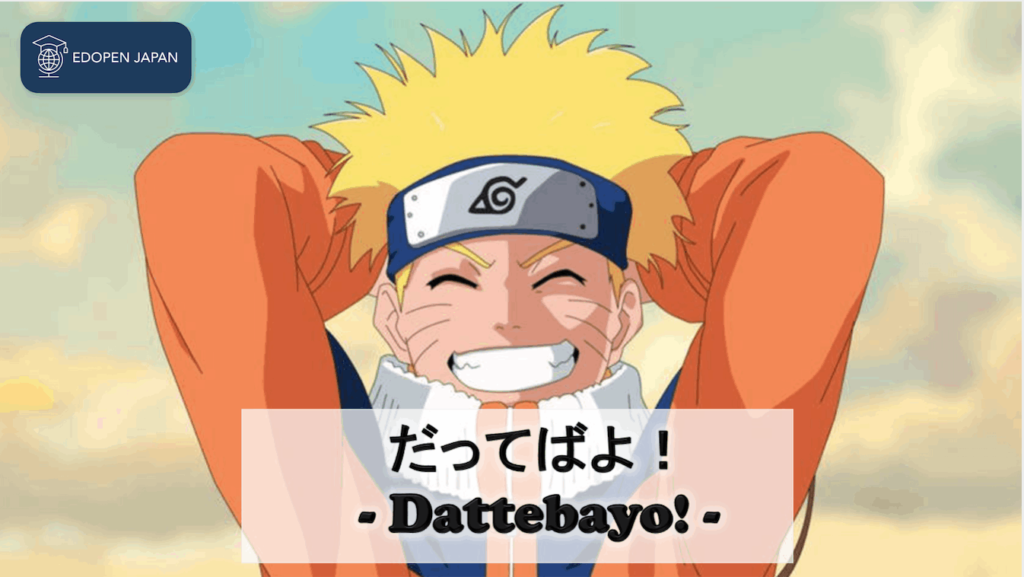
Secondly, since this phrase, a catchphrase actually, comes from the insanely popular anime around the world, Naruto, originally a Japanese manga series written and illustrated by Masashi Kishimoto, has always remained the most popular must-watch anime and must-read manga/comic in the world, let’s talk about it.
This manga is then internationally known as an anime and film series. It tells the story of Naruto Uzumaki, a young ninja seeking recognition from his peers and dreaming of becoming the Hokage, the leader of his village (Konoha).
Then Naruto says this phrase (〜だってばよ! or dattebayo) as his iconic line, which is usually either said by itself or added to the end of something else Naruto says. If you watch the sequel to Naruto Shippuden, the previous translation of this line was “Believe it!”, which was changed to “You know/ya know!”. This translation is actually incorrect from a grammatical point of view.
Why? It is because this phrase actually has more or less less meaning, it is just 口癖 (Kuchiguse ‘bad habit of speaking’).
Interestingly, this phrase is also said by Naruto’s mother (Kushina) and Naruto’s son (Boruto), with slightly different variations as below:
Kushina: 「だってばね!」 Dattebane!
Boruto: 「だってばさ!」Dattebasa!
respectively.
Let’s also look at the original meaning of the phrase and break it down into the following parts:
- 「だ (da)」: the colloquial version of the copula, casual phrase of 「です (desu)」
- 「ってば (tteba)」: ” I said,” or, “I told you” or “I am telling you”
- 「よ (yo)」: the emphasis particle.
On the other hand, the Japanese do not often say this phrase in everyday conversation. In fact, it is rarely heard in standard Japanese. So again, consider not using it when speaking to a native Japanese speaker.
3. “Kaizokuou Ni, Ore Wa Naru!” – Monkey D. Luffy
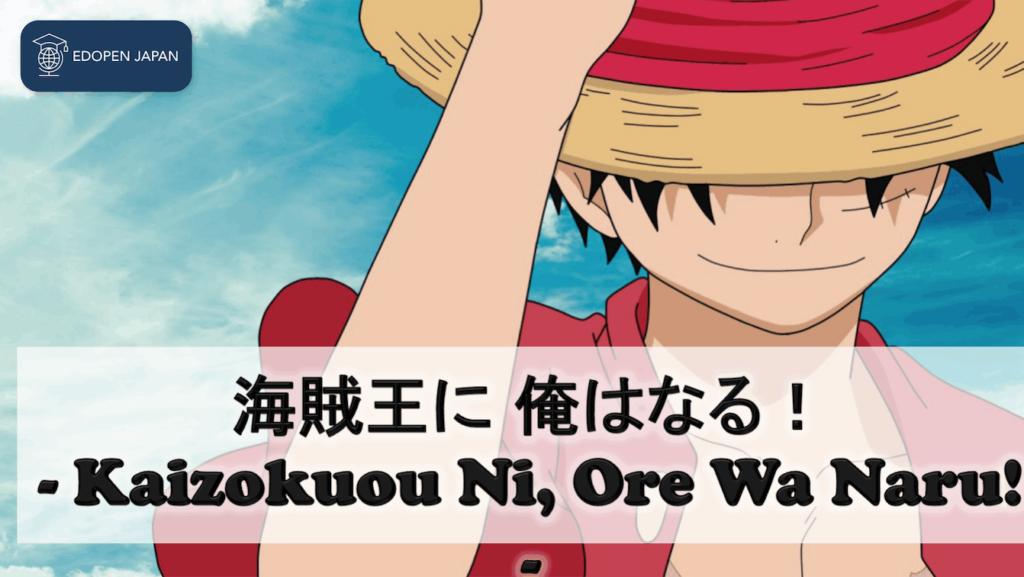
Who doesn’t know One Piece? It is a Japanese manga and anime series written and illustrated by Eiichiro Oda. Proudly, One Piece has received an abundance of praise for its storytelling, art, characterisation and humour. This great Japanese manga and anime series has won many awards and is considered by critics, reviewers and readers to be one of the best manga of all time.
In One Piece, there is one of the most popular phrases said by Luffy, the main character in this manga/anime. That is 「海賊王に 俺はなる!(Kaizokuou ni, Ore wa naru!). The original meaning of the word in this phrase is as follows:
「海賊王(kaizokuou )means The Pirate King
「に(ni)」is a particle that indicates the purpose
「俺(ore)」means ”me or I (casual usually used only by men in Japanese)”
「は(wa or ha)」is a particle that indicates the subject
「なる!(naru)」means “be or become”
Therefore, the meaning of this line can be concluded as “(to be) The King of Pirates, I will be!” or grammatically translated as “I will be The Pirate King”, as we found in every English translation used. This pattern of sentence, 〜になる(ni naru), is commonly used in Japanese. You can use it to make any other kind of sentence that indicates purpose or direction.
4. “Yare Yare Daze!” – Jotaro Kujo
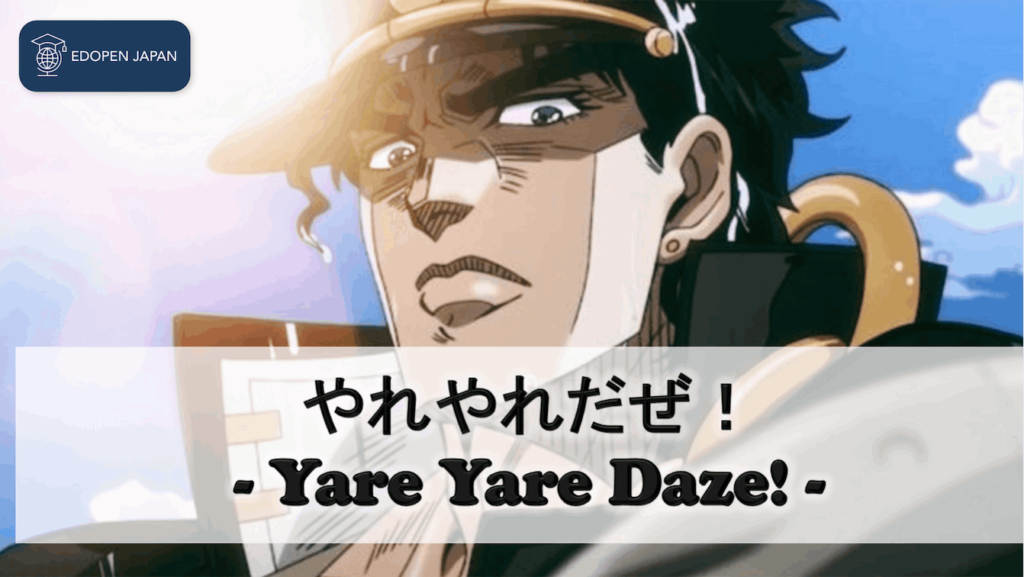
Originally, the phrase “Yare Yare Daze!” became very popular as a catchphrase associated with Jotaro Kujo, the main character of the long-running Shonen manga series JoJo’s Bizarre Adventure with the title Stardust Crusaders, which ran from 1989 to 1992. This line then appeared in the second episode of this manga series on 11 April 2014.
Depending on the situation, this phrase has several different meanings. In the manga and anime series, the phrase is translated as follows:
- “well well,… ”
- “good grief,…”
- “What a pain,…” and
- “Give me a break…”
This phrase is actually not used very often in real Japanese conversation. It is very casual as you may know that in anime, the phrase is usually very casual to make the conversation become natural. However, some phrases are not recommended to be used if you are learning Japanese quickly.
5. “Mada Mada Dane” – Ryouma Echizen
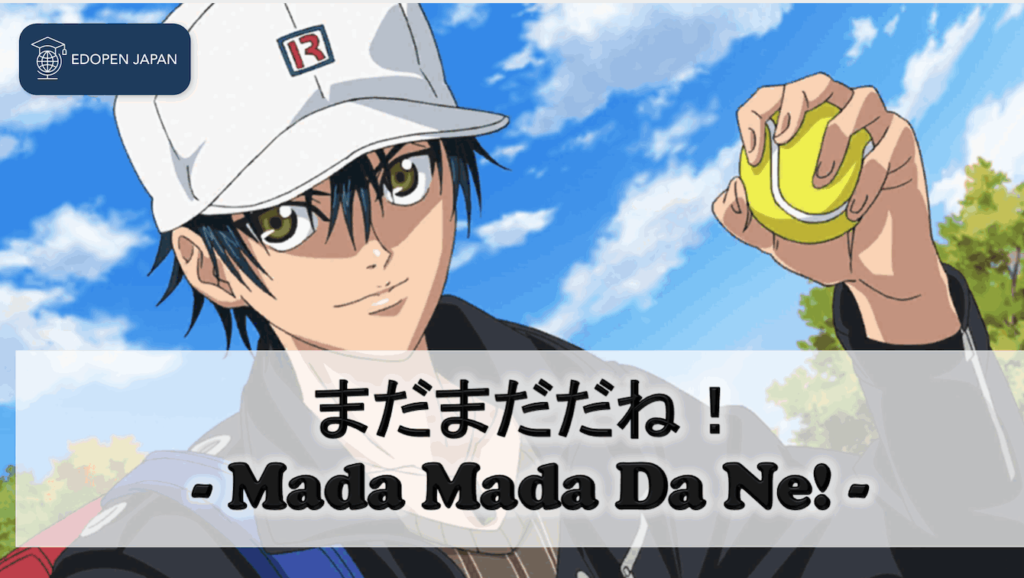
Mada mada dane (まだまだね commonly written in Japanese hiragana) is a phrase popularised by Ryoma Echizen, a fictional character and the protagonist of the manga and famous anime series The Prince of Tennis created by Takeshi Konomi.
Furthermore, the meaning of the phrase he often said, which became an iconic line literally meaning “No, not yet”, unfortunately varies depending on the situation in which the phrase is used. As in the original Japanese, the phrase comes from the word まだまだ, which means not yet.
Specifically, this phrase can also be translated as the following options:
- “You still have a long way to go”
- “Not good enough” or
- “Still no good” and
- “It’s not over yet”
- “You still have lots more to work on.”
- “You still have a ways to go.”
Also, in the scene where he says this line, he says it to confuse his rivals. Fortunately, this phrase is commonly used by the Japanese, especially the word まだ (mada), and you will often hear them say this word in everyday conversation.
6. “Tensai Desu Kara!” – Hanamichi Sakuragi
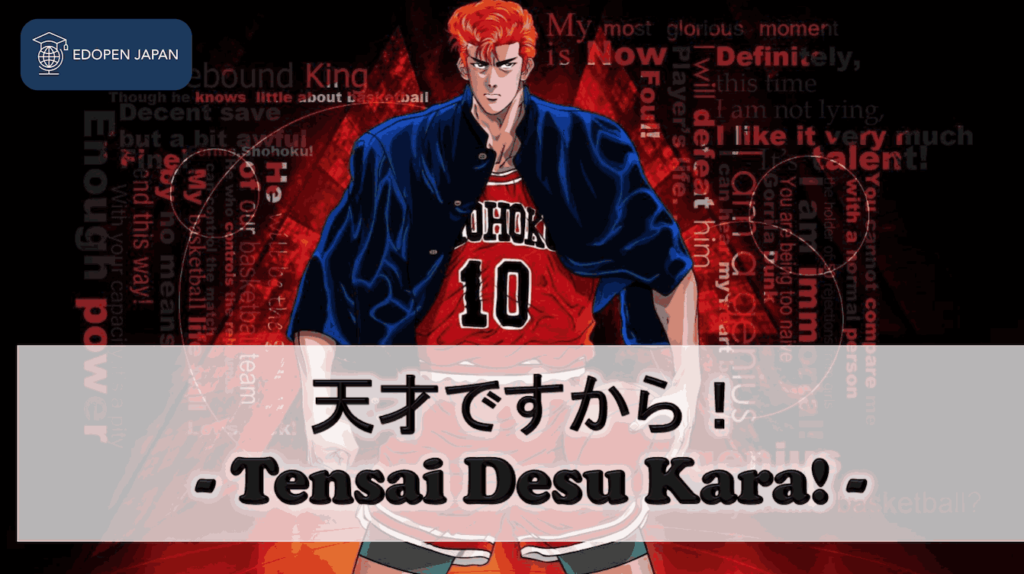
In this 6th place, the choice of a legendary line from the main character of the Japanese sports manga Slam Dunk, Hanamichi Sakuragi, is a perfect choice. As you may already know, this sensational phrase has been popular among manga fans for many years.
Furthermore, the phrase is 「天才ですから!(Tensai desu kara!), which can be broken down into the following literal meanings:
- 天才(tensai): genius
- ですから (desu kara): it is a way of saying because/since in Japanese with a strong emphasis
Therefore, the meaning of this sentence can be concluded as “Because I’m a genius”.
7. “I don’t know everything, I just know what I know.” – Hanekawa Tsubasa
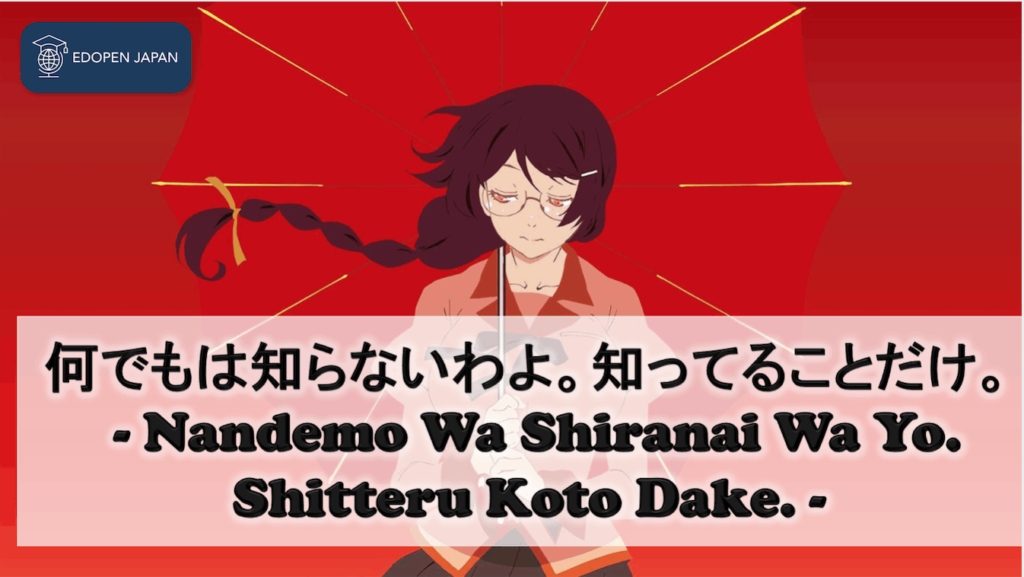
If you know Tsubasa Hanekawa, she is the main character of the Monogatari series. This series is said to be one of the most dialogue-heavy anime out there. Again, anime fans are drawn to the series more for the narration, character interaction and character development than anything else.
In this anime series, there is the most famous phrase, the line uttered by Tsubasa Hanekawa.
The phrase is “I don’t know everything, I only know what I know”, which originally reads as follows in Japanese;
何でもは知らないわよ。
Nandemo wa shiranai wayo.
知ってることだけ。
Shitteru koto dake.
Well, it is very straight and powerful right as well as very thoughtful line in this anime. What do you think?
8. “Shinjitsu Wa Itsumo Hitotsu!” – Conan Edogawa
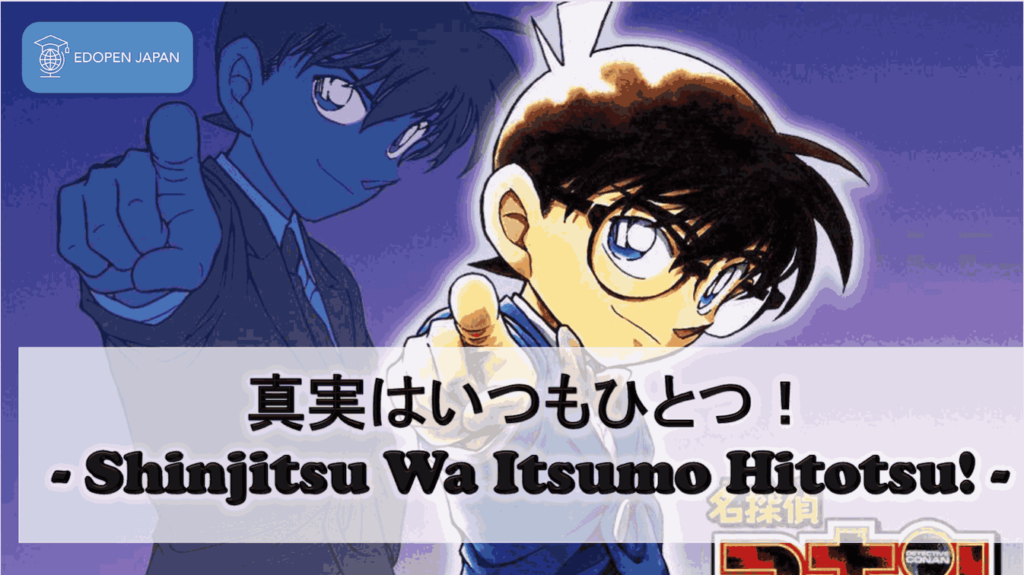
Detective Conan is a remarkably long-running Japanese anime series that also has a level of consistency like One Piece and Naruto. Like another long-running anime, there’s always a special scene with super wisdom that we can relate to and that deeply inspires us.
Then there is a popular phrase that always ranks number 1 and is said by the Edogawa Conan and Sinichi Kudo as the main character in this anime, which is
真実はいつもひとつ!
Shinjitsu wa itsumo hitotsu!
(There is always one truth!)
As mentioned above, if we break down this phrase, we can see the literal meaning of each word as follows:
- 「真実(shinjitsu)」: truth
- 「は(wa)」: a particle that indicates the subject
- 「いつも(itsumo)」:always
- 「ひとつ(hitotsu)」:one
Therefore, we can conclude that the meaning of this phrase is “There is always one truth”.
9. “Keikaku Doori” – Light Yagami
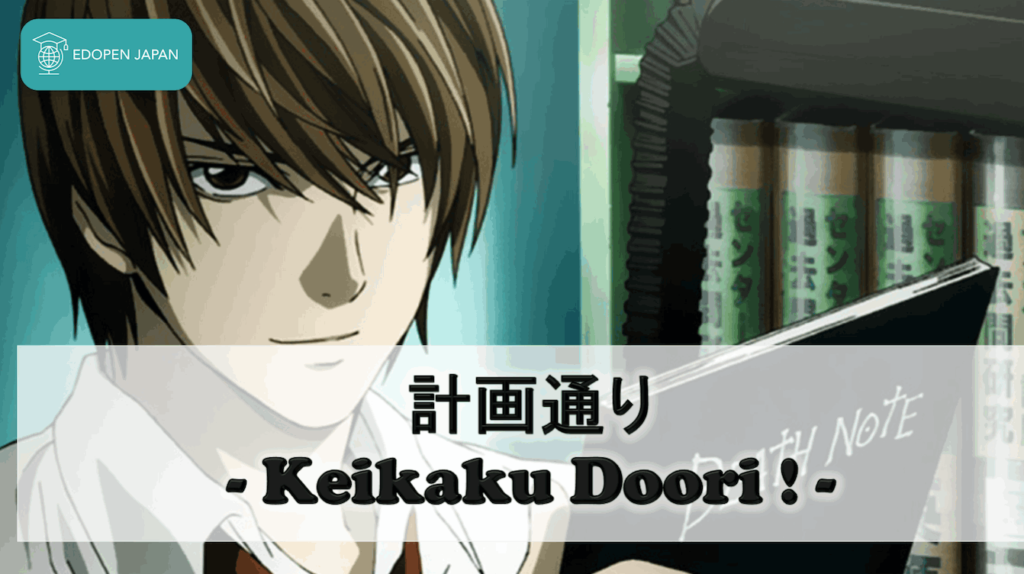
Death Note is originally a Japanese manga series written by Tsugumi Ohba and illustrated by Takeshi Obata. The story follows Light Yagami, a teenage genius, who discovers a mysterious notebook: the “Death Note”, which belonged to the Shinigami Ryuk, and which gives the user the supernatural ability to kill anyone whose name is written on its pages.
There is a memorable phrase during the scenes in this anime, which is 計画通り(keikaku doori))in Japanese. Light Yagami, the main protagonist of this super cool manga and anime series, says this sentence.
To understand this original Japanese phrase, let’s look at the meaning of each word below:
- 「計画(keikaku)」:plan
- 「通り(doori)」:just as
It can therefore be concluded as planned. Fortunately, this is a very common and casual expression. You can also use this phrase when talking to your Japanese friend.
10. “Nico Nico Nii!” – Nico Yazawa
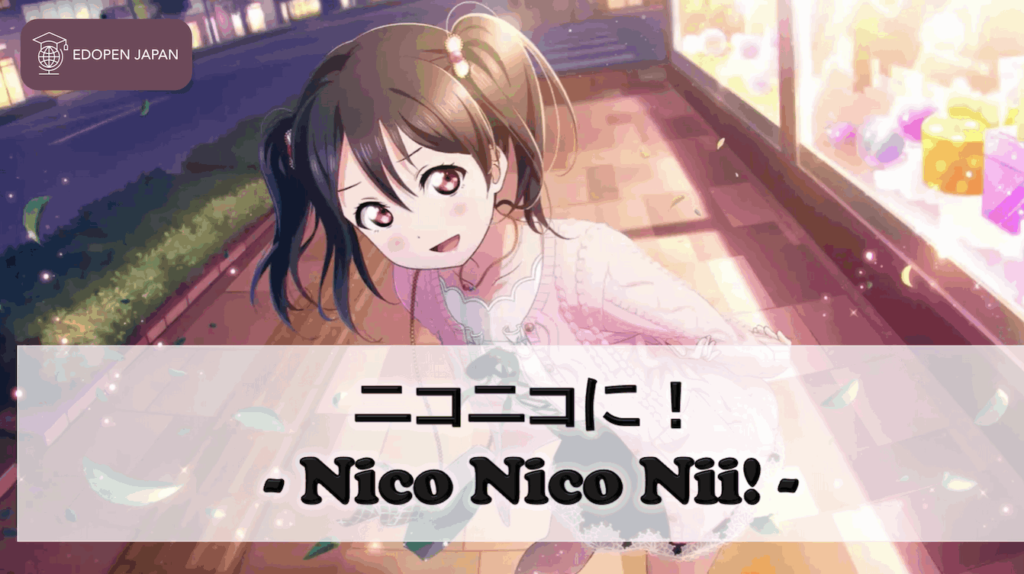
Have you ever heard the phrase “Nico Nico Nii” popping up all over social media and YouTube as it has gone super viral? This cute phrase is actually a catchphrase as well as a slogan of the anime titled Love Live! School Idol Project. It is said by Nico Yazawa, one of the nine main characters in the anime.
Next, the phrase “Nico Nico Nii” is said to be the most viral, taking social media by storm. Do you know what it means? Turns out it’s not a real Japanese word. But it does have an adorable backstory.
In Japanese in particular, there is the expression “niko niko にこにこ”, which is the onomatopoeia of smiling. This is a common Japanese phrase that is often used by Japanese people in normal conversation. So we can assume that it basically means that you are smiling in your heart.
What’s more, this sentence is said together with the following sentences, which means it couldn’t stand alone. This phrase was said with the following 3 sentences, let’s see what they mean:
- あなたのハートににこにこにー
Anata no ha-to ni niko niko ni.
You are smiling in your heart.
- 笑顔届ける矢澤にこにこー
Egao todokeru Yazawa nikoniko
I will put a smile on your heart!
- にこにーって覚えてラブにこー
Ni ko ni tte oboete rabu niko!
Remember Nico! Nico loves you!
Conclusion
Finally, we can conclude this article with the following conclusions:
- Some of the most popular Japanese phrases in anime have a unique expression as well as a meaning that is very similar to the characters.
- All phrases used in manga and anime are usually very casual and it is highly recommended to use them only in casual conversation and not in formal conversations.
- Learning Japanese from manga and anime would be very interesting to increase the casual vocabulary for Japanese learners, not only by memorising the catchphrases or just the single phrases, but to catch the whole sentences that the characters said would be more appropriate.

